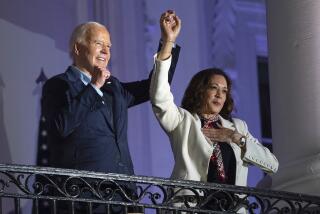Back to the Status Quo? . . . Well, Not Entirely : The currents stirred by Perot can be crucial in defining campaign’s issues
For many Americans who hoped this presidential race would be different, Thursday was a shocking and bitter day.
For those who believed that choices about the country’s future were too critical to be made by the two long-established and deeply encrusted political parties, Ross Perot’s exploratory presidential candidacy represented a historic opportunity.
Its surprise ending returned American presidential politics to the status quo ante. But the after effect of Perotmania may yet be beneficial--if the energy released can be redirected to make the major parties more responsive to an obviously angry electorate.
THE NEW REALITY: Now, barring some totally unexpected political bombshell, the next President of the United States will be either Bill Clinton or George Bush. But even if the Texas billionaire had stayed in the race to the end, that was always the likely case. Perot himself came to understand that. “I have concluded we can’t win in November,” Perot told a Dallas press conference Thursday. “I believe it would be disruptive (to run) . . . so therefore I will not become a candidate.”
It is difficult, if not impossible, for a candidacy not backed by one of the two major political parties to succeed. For better or for worse, the structure of American politics consists of two major political parties. That’s the system.
What is most remarkable is not that Perot has bowed out but that he has been so significant a factor from almost the moment he began to publicly entertain the thought of an independent run for the White House.
THE CONTINUING DISAFFECTION: That says a lot not only about his forceful personality but also about the restless and disaffected mood of the American people. Throughout this volatile presidential season--whether via the upstart candidacies of Republican Patrick J. Buchanan, Democrat Edmund G. (Jerry) Brown Jr. or Perot--Americans have been trying to send angry and noisy messages to anyone, especially pollsters and the media, who would listen.
Sensing that mood, Perot drew many Americans to his side and became a leading proponent of change. If his still unformed effort was short on specifics, it was long on emotion.
Pulling the plug on that emotion left many of his ardent supporters puzzled and, in some cases, more than a little miffed. Perot had brought them to such peaks; and now he was pulling out. That has to be very tough to accept.
Still, Perot said he felt he simply could not win--and said he rejected the role of the spoiler who might realize from his efforts nothing more than the unsatisfactory result of sending the election to the House of Representatives for resolution. Perot deserves credit for avoiding that potential tumult. He deserves credit for helping dramatize the disaffection of many Americans with the current political process; and because he did so he must be credited with helping set the agenda for debate in this campaign.
AFTER PEROT: Now that he is moving off stage, where do all those Perot supporters go? That’s the question that operatives in the Democratic and Republican parties are now eagerly trying to figure out. On Thursday Perot himself refused to back either candidate, though he did make a point of saying something nice about the Clinton effort: “The Democratic Party has revitalized itself. They’ve done a brilliant job, in my opinion, in coming back.”
Whatever the ultimate political impact of his withdrawal, it’s clear that the whole electoral calculation of the race has been altered. Perot, already on the ballot in 24 states, may still garner votes from his most ardent fans. But undoubtedly Ross Perot also has left a lot of already angry people--who viewed him as the outsider-savior who would purify American politics--even angrier. Some, maybe many, could choose to stay home on Election Day. We hope not. Those who cared enough about this country to want to work for Perot must now understand that their country needs them, and their votes, just as much now--perhaps even more.
More to Read
Get the L.A. Times Politics newsletter
Deeply reported insights into legislation, politics and policy from Sacramento, Washington and beyond. In your inbox three times per week.
You may occasionally receive promotional content from the Los Angeles Times.










